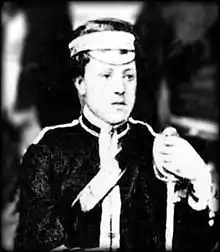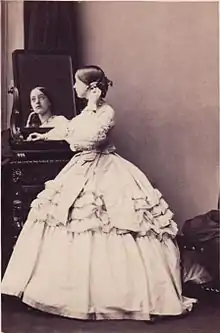Henry Rawdon-Hastings, 4th Marquess of Hastings
Henry Weysford Charles Plantagenet Rawdon-Hastings, 4th Marquess of Hastings and 9th Earl of Loudoun (22 July 1842 – 10 November 1868), styled Lord Henry Rawdon-Hastings from birth until 1851, was a British peer. He was also, starting from most senior barony, 21st Baron Grey of Ruthyn (of 1324), 20th Baron Botreaux (of 1368), 19th Baron Hungerford (of 1426), and 17th Baron Hastings (of 1461).[1]
The Marquess of Hastings | |
|---|---|
 Photograph of Lord Hastings as Lieutenant in the Leicestershire Yeomanry, 1861. | |
| Personal details | |
| Born | Henry Weysford Charles Plantagenet Rawdon-Hastings 22 July 1842 |
| Died | 10 November 1868 (aged 26) |
| Spouse(s) | Lady Florence Paget
(m. 1864) |
| Parents | George Rawdon-Hastings, 2nd Marquess of Hastings Barbara Rawdon-Hastings, Marchioness of Hastings |
| Relatives | Edith Rawdon-Hastings, 10th Countess of Loudoun (sister) |
Early life
Rawdon-Hastings was the second son of George Rawdon-Hastings, 2nd Marquess of Hastings, the British peer and courtier, and his wife Barbara née Yelverton, 20th Baroness Grey de Ruthyn.[1] His father died when Henry was only two years old, and Henry succeeded to his father's titles upon the early death of his older brother Paulyn seven years later, when Henry was aged nine. Later, in 1858, Henry inherited his mother's barony at the age of sixteen.[2]
In 1860, The Times noted that Rawdon-Hastings was one of only three to hold peerages in all three Kingdoms of England, Scotland and Ireland (as Earl of Moira).[3]
Marriage

In 1862 Lord Hastings became engaged to Alice March Phillipps de Lisle, but they never married (she later married the Hon. Arthur Strutt, younger son of Lord Belper).
On 16 July 1864 he married Lady Florence Paget, the only daughter of Henry Paget, 2nd Marquess of Anglesey.[4] The marriage created a scandal as the bride had been engaged to Henry Chaplin.[5]
He died in 1868, aged only 26, with no children. The Marquessate of Hastings became extinct, while the Earldom of Loudoun passed to his eldest sister Lady Edith and his English baronies fell into abeyance between Lady Edith and their three other sisters – all would go to Edith except their mother's, which passed to the second sister, Lady Bertha.[1]
After his death, his widow, Florence, Marchioness of Hastings would marry Sir George Chetwynd, 4th Baronet on 9 July 1870.[6]
References
- "Hastings, Marquess of (UK, 1817 - 1868)". www.cracroftspeerage.co.uk. Heraldic Media Limited. Retrieved 6 March 2020.
- Haydn, Joseph (1851). The Book of Dignities: Containing Rolls of the Official Personages of the British Empire ... from the Earliest Periods to the Present Time ... Together with the Sovereigns of Europe, from the Foundation of Their Respective States; the Peerage of England and Great Britain ... Longmans, Brown, Green, and Longmans. p. 538. Retrieved 6 March 2020.
- The Times, 9 February 1860; Peers Of The Three Kingdoms.
- Malcomson, A. P. W. (2006). The Pursuit of the Heiress: Aristocratic Marriage in Ireland 1740-1840. Ulster Historical Foundation. p. 269. ISBN 978-1-903688-65-6. Retrieved 6 March 2020.
- The 1867 Derby at macla.co.uk
- 8 papers relating to claims to the baronies of Botreaux, Hungerford, De Molyns and Hastings. 1870. p. 105. Retrieved 6 March 2020.
External links
| Peerage of the United Kingdom | ||
|---|---|---|
| Preceded by Paulyn Rawdon-Hastings |
Marquess of Hastings 1851–1868 |
Extinct |
| Peerage of Scotland | ||
| Preceded by Paulyn Rawdon-Hastings |
Earl of Loudoun 1851–1868 |
Succeeded by Edith Rawdon-Hastings |
| Peerage of England | ||
| Preceded by Paulyn Rawdon-Hastings |
Baron Hastings Baron Botreaux Baron Hungerford Baron de Moleyns 1851–1868 |
Succeeded by Abeyant Title next held by Edith Rawdon-Hastings, 1871 |
| Preceded by Barbara Rawdon-Hastings |
Baron Grey of Ruthyn 1858–1868 |
Succeeded by Abeyant Title next held by Bertha Clifton, 1885 |